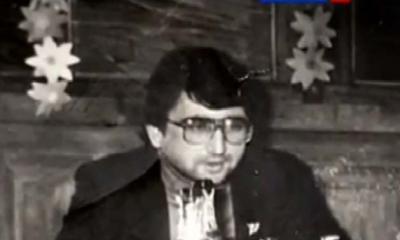Adam Ferguson(English) Adam Ferguson) - philosopher and historian, professor of moral philosophy at the University of Edinburgh. Adam Smith teacher.
Experiences in the history of civil society
His main work Essay on the history of the civil society» Ferguson published in 1766. From the point of view of literary form, he suffered from verbosity, some trivial lengths and great heaviness. But against the backdrop of heavy presentation, some strong and fruitful ideas stood out. Ferguson is one of the founders of positivist and sociological attempts at an empirical and at the same time constructive understanding of the development that forms of human society go through from a primitive stage to a higher culture under the influence of general laws. He tried to do so, not only following Montesquieu's impulses, but also moving in the footsteps of Hume, for Ferguson emphasized the importance of instinct in the emergence of society. Then he, under the strong influence of Lafito's method, compared this material with the reports of Tacitus about the ancient Germans and with ancient stories about early Rome and Sparta. He demonstrated a special understanding of the changing forms of society as a result of growing social differentiation.
Along with positivist tendencies, Ferguson expressed significant ideas that led to historicism. Having experienced the beneficial effect of Hume's doctrine of instincts, he energetically opposed ordinary pragmatism, which tends to explain the emergence and change of state formations by the conscious motives of people. The origin of social institutions, he said, lies in a dark and distant past. They arise from natural inclinations, and not from the speculative constructions of people. As if in the dark, people groped for institutions that were not foreseen, but arose as a result of their activities. At the same time, Ferguson recalled the words of Cromwell that a person never rises higher than when he does not know where he is going. Thus, the doctrine of the emergence of the state as a result of the conclusion of the treaty collapsed in the eyes of Ferguson. The structure of Rome and Sparta, this favorite object of pragmatic observation of the state, was based, from his point of view, not on the plans of individuals, but on the situation in which the people and their geniuses were.
Main works
An Essay on the History of Civil Society (1767)
The History of the Progress and Termination of the Roman Republic (1783)
Principles of Moral and Political Science; being chiefly a retrospect of lectures delivered in the College of Edinburgh (1792)
Institutes of Moral Philosophy (1769)
Reflections Previous to the Establishment of a Militia (1756)
Source: http://ru.wikipedia.org/wiki/Ferguson_Adam
Adam Ferguson
Ferguson (Ferguson) Adam (June 20, 1723, Logiright, Perthshire - February 22, 1816, St. Andrew, Scotland) - Scottish philosopher. Born into the family of a Presbyterian minister. In 1742 he received a master's degree from the University of St. Andrew and moved to the University of Edinburgh. There he became close to the future playwright John Home and the future rector of the University of Edinburgh, historian W. Robertson. In 1757 he became the successor D. Yuma as caretaker of the lawyers' library. In 1759 he took the chair of natural philosophy at the University of Edinburgh. In 1767, Ferguson's main book, An Essay on the History of Civil Society, was published, which met with a favorable reception, in 1769, Instructions on Moral Philosophy "(Institutes of moral Philosophy, Russian translation of St. Petersburg, 1804, as well as "The Initial Foundations of Moral Philosophy". M., 1804). Fertuson is translated into European languages, his "Experience" is used in training courses Moscow University.
As a representative of the Scottish Enlightenment, Ferguson shared the theory of moral sense and philosophy common sense while challenging some of Hume's ideas, A. Smith, as well as Mandeville and Rousseau and subjecting moralistic criticism to the "welfare" of a commercial society leading to political corruption.
M. A. Abramov
New Philosophical Encyclopedia. In four volumes. / Institute of Philosophy RAS. Scientific ed. advice: V.S. Stepin, A.A. Huseynov, G.Yu. Semigin. M., Thought, 2010, vol. IV, p. 183-184.
Read further:
Philosophers, lovers of wisdom (biographical index).
Adam Ferguson (1723-1816) is a representative of a brilliant galaxy of Scottish thinkers of the Age of Enlightenment. His main book, An Experience in the History of Civil Society, was published in 1767 and quickly gained European fame, withstood 7 editions during the author's lifetime. In 1817-1819. An incomplete Russian translation of Ferguson's book appeared. Here is an excerpt from his book. The text is cited from the publication: Ferguson A. Experience in the history of civil society / Per. from English. Ed. M.A. Abramov. - M .: "Russian Political Encyclopedia" (ROSSPEN), 2000.
ON THE DEVELOPMENT AND LIMITS OF DESPOTISM
Mankind, whenever it is in the process of degeneration, decline, and also in periods of progressive development, the achievement of advantages, often reduces the pace of development to slow, barely noticeable steps. If, in centuries of turbulent activity, people achieve such greatness that all human wisdom did not even think about, then in periods of weakness and inactivity they incur so many evils that they never dreamed of even in a terrible dream - this seemed to them completely impossible against the background of recent success and prosperity. We have already noted that where people sin by negligence or corruption, the virtue of their leaders or the good intentions of the magistrate is not always able to preserve their political freedom. Unconditional obedience to any leader or uncontrolled exercise of any powers, even if all this is aimed at the benefit of mankind, often ends in undermining the institutions of law. This fatal revolution, by whatever means it may be carried out, ends with the rule of the military; the latter, despite being the simplest of all forms of government, gradually takes its final form.
In the first stage of exercising such a government over people who previously acted as members of a free community, it can only lay the foundations, without imposing all the components of a despotic policy. The usurper who, with the help of the army, has taken possession of the central part of a great empire, perhaps sees around him the scattered remnants of what was once a constitution, hears the murmur of people who obey him lazily and reluctantly; perhaps he even feels the danger coming from those from whose hands he has knocked the sword, but whose hearts have not submitted to him and have not resigned themselves to his power. The idea of their rights that persists in certain sections of society, as well as claims for privileges and honors, are serious obstacles to usurpation. If they do not disappear of their own accord with time, and do not lose their force as the corruption of society deepens, they must be eradicated by force; so that every new step in the conquest of power leaves behind bloody traces.
The results, even in such a case, come with some delay. The spirit of Rome, as we know, could not be completely destroyed either by a series of rulers, or by repeated bloodshed and poisoning. Noble and respectable families continued to desire the return of their original honors: and in the solitude of their souls they did not tire of seeking solace in the study of the history of the republic, in the writings of bygone times, contemplation of the monuments of famous people and appeals to the lessons of philosophy, imbued with heroic ideas; all this gave birth to those outstanding personalities, whose sublimity and the very fate of which constitute, perhaps, the most exciting theme of human history. Unable to resist the general tendency to servility, they, due to their personal characteristics, became objects of distrust and antipathy; and the price of feelings silently nurtured in their chest, they had to pay with blood.
What guides the sovereign in choosing measures to establish his own rule in the face of the growing threat of despotism? He is guided by erroneous ideas about his own good, and sometimes also about the good of his people; in addition, he is guided by the desire to remove - as they arise - the obstacles that stand in the way of his will. Once he has made a decision, anyone who opposes him becomes his enemy; if he hatches lofty designs, then anyone who claims to be of high position and intends to act independently is his rival. He leaves to the state no dignity other than that which he himself possesses, no effective force other than that which bears the stamp of his fleeting pleasure. Guided by impressions, which have the infallibility of instinct, he never errs in choosing the objects of his likes and dislikes. The spirit of independence repels him, the spirit of servility attracts him. His rule is aimed at the suppression of every untamed spirit and at the concentration in his hands of all leading functions. If the power is true to itself to the end, it functions just as well in the hands of those who are not aware of such an outcome, as well as those who are fully capable of foreseeing it: the powers of both are not discussed - if they are genuine; if these are false or misunderstood powers, they are retained by force.
“You must die,” was Octavius’ answer to the petition of each of the people asking him for mercy. The same sentence was pronounced by some of his followers against any of the citizens distinguished by noble birth or outstanding virtues. But are the vices of despotism exhausted by the cruelty and bloodthirstiness with which it established or maintained dominion over unyielding and restless people? And is death the greatest of the misfortunes that threaten people in conditions of lack of rights? Of course, they often managed to survive, but their souls were filled with distrust and jealousy, a sense of their own insignificance and anxiety generated by various insignificant concerns; every citizen turned into a slave, everything that previously united the members of society disappears. There remains only one civic duty - obedience, but even this must be achieved by force. If, with such an establishment, spectacles full of humiliation and horror become inevitable, and each eyewitness may himself become a participant in such scenes, then death becomes a deliverance from torment; and that libation from the veins, to which Thrasea was forced, may be considered a worthy sacrifice for the glory of Jupiter the Liberator.
Oppression and cruelty are not always inherent in despotic rule; but even where they are, they are only a part of the evil. Such a government is based on corruption and the trampling of all civil and political virtues; it forces its subjects to act out of fear; it indulges the passions of the few at the expense of the many, and establishes peace in society on the ruins of freedom and confidence, which alone can ensure the viability, strength and loftiness of the human spirit. Under the conditions of a free constitution, in which each individual occupies a certain position, enjoys certain privileges and has an idea of \u200b\u200bhis personal rights, members of the community are objects of attention and respect for each other; Solving the problems of civil society involves not only the use of power, but also talents, wisdom, and the power of persuasion. But under a despotic government, the highest virtue is to rule solely by command, rejecting all but coercive means. Therefore, as a result of this policy, the ability of a person to understand and feel, as well as his imagination, gradually become unclaimed; and just as smoothly and gradually as the accumulation of the achievements of mankind, which acted in society on the principles of freedom, took place earlier, it degenerates under the influence of the misadventures described above.
When we hear stories about how quiet there is in the seraglio, it seems that there is simply no need for verbal communication: to carry out the orders of the rulers, the signs used by the dumb are enough. No skill is required to maintain power where power is opposed only by fear, where the authority of the sovereign is wholly delegated to any official subordinate to him; no position occupied provides freedom of thought in an atmosphere of silence and depression, when hearts are filled with jealousy and apprehension, and nothing but carnal pleasures can ease the suffering of either the sovereign himself or his subjects. In other states, the improvement of the abilities of people is sometimes associated with belonging to the upper strata of society. But in the case under consideration, we are dealing with a situation where the ruler himself is perhaps the most rude and uncultured representative of society; he is inferior to that slave whom he himself raised from his miserable state to the rank of his confidant. The primitive simplicity underlying the bonds of friendship and intimacy that bind the sovereign to the shepherd of his flock seems to be repeated in a situation that excludes all attachments; more precisely, here we are dealing with an imitation of this simplicity in conditions of ignorance and rudeness, equally inherent in all sections of society, or rather, erasing differences in the position and personal qualities of people as a result of despotic rule.
The reign of the sovereign is built on whim and passion. Everyone to whom he delegates authority should act in the same spirit, responding with a blow to a provocation and a favor for the pleasure he has been given. In everything that concerns revenues, law or police, each provincial ruler acts like a leader behind enemy lines: he is armed with such means of deterrence as fire and sword, and instead of collecting taxes appoints compulsory indemnities; he is ready both to ruin and to spare - depending on what will be profitable for him in this moment. Of course, when the groans of the oppressed or the glory of the riches accumulated at the expense of the locality reach the ears of the sovereign, the money-grubber is usually punished for covetousness, losing part or all of the plunder; but the victims are not compensated for the damage - not at all: the viceroy's crimes are used as a pretext for robbing the people and punishing them by filling the sovereign's treasury.
It is noteworthy that in this situation of complete oblivion of the principles of just government and national politics, even the craft of a soldier is in decline. The ignorance and mediocrity of the princeps are offset by his incredulity and jealousy. Both together undermine the foundation on which his power rests. An army begins to be called any armed crowd, and a weakened, scattered and unarmed people becomes a victim of disorder in the army or is doomed to death in the face of an enemy drawn to the borders of despotism by a desire for profit or conquest. The Romans expanded their empire until there were no enlightened nations left that they had conquered, and came across a frontier beyond which they were surrounded on all sides by ferocious barbarian tribes; they even went through the wild desert in order to alienate such restless neighbors from themselves and to create corridors through which they could threaten them with an attack. But this policy turned out to be the last straw of the internal disintegration of the state, a few quiet years were enough for even the government to forget about the danger, leaving the cultural province in the form of easy prey and a seductive gift to the enemy.
When the formation of the empire is completed by the conquest and annexation of all the rich and cultured provinces, the whole people begins to fall apart into only two categories: peaceful and rich people living within the borders of the empire, and poor, ferocious, predatory people, accustomed to raids and wars. Between the first and second, the relationship of sheep and wolves reigns; Naturally, they are hostile towards each other. Meanwhile, if the despotic empire were given the opportunity - in the absence of an external threat - to continue to exist serenely for an indefinite time, then until the corruption underlying it would be eliminated, this state would not show signs of the birth of a new life, the resurrection of freedom and political activities. Seeds sown by a despot lord will not germinate until they wither; they must wither and lose strength under the weight of their own depravity - until the human spirit revives, until it bears the fruits that constitute the honor and happiness of human nature. Of course, even in times of the greatest humiliation, not everything freezes around; but the persisting movements of the spirit do not in any way resemble its manifestations in free people: they are either the agony of nature, crushed by human suffering, or bouts of confusion, engulfing the armed servants of the prince, who by the device of conspiracies, attempts and murders only plunge the civilian into even greater horror and despair .
People scattered over remote provinces, unarmed, ignorant of the noble feelings of unity and cohesion, weakened by the conditions of ruin and dragging out a miserable existence on the crumbs that remain after government extortions - these people are not capable, under the circumstances, of developing a spirit of unity, nor to carry out free association for the purpose of organizing self-defence. The victim is free to complain - and, not receiving favors from the government, he has the right to appeal to the compassion of his fellow citizens. But fellow citizens are also glad that they themselves have passed the sad fate of the complaining: everyone takes care of himself, trying to grab his share of pleasures available to him, fishing in troubled waters of uncertainty and secrecy.
Commercial professions that need no other basis than human selfishness, and require no other incentives than the hope of making money and keeping their property intact, in the unsteady conditions of slavery (under which it is dangerous to be rich), are doomed to disappear. Meanwhile, the poverty of the people and the suppression of commerce are aspects of despotism that are harmful to itself. Where there are no more profits to corrupt, or fears to temper the desires, the spell of domination is broken, and the naked slave who comes to his senses discovers with amazement that he is free. When the fence is broken, a vast expanse opens up in front of the herd, and it breaks free. Cultural pasture does not attract him if there is access to the desert plains. The sufferer willingly rushes where the greedy hand of the government cannot reach him; where even the humble and servile are able to remember that they are people; where the threatening tyrant is just one of your tribesmen who can take nothing from you - except perhaps your life, and even that at the risk of losing your own.
Confirming what has been said, the fear of tyranny discouraged the inhabitants of many countries of the East from becoming settled. Villagers leave their homes and embark on wanderings; the population of the valleys flees to the mountains and, once becoming easy-going, hunt for robbery and war with the former rulers. Such unrest, coupled with governmental arbitrariness, undermines the security of other settlements; but as the destruction that comes from all sides deepens, people again find themselves forced to seek associations, again become strong and self-confident individuals, able to exist as members of society and take up arms, which in ancient times turned a tiny tribe into the embryo of a great nation. Thanks to all this, the freed slave can again become a citizen and take up the development of commerce. Having reached the extreme stage of depravity, human nature enters the path of rebirth.
This is how the frequent change of pictures of human life happens. The sense of security and arrogance of the people prevent them from enjoying the fruits of prosperity; on the other hand, resolute and righteous behavior resists the vicissitudes of fate; people, when they find themselves in a position where they have nothing to hope for but their own virtues, acquire the ability to achieve any advantages; when they are most inclined to rely on fate, it most often turns to them with its reverse side. In such a course of things, we tend to see a pattern: losing the desire to protect the interests of our country, we hide our own weakness and recklessness behind references to fatal coincidences. Human institutions do indeed have a beginning and an end, but their longevity is not something preordained. The internal disintegration of nations always occurs only because of the depravity of its members.
Sometimes we willingly acknowledge this sin for our fellow tribesmen; but who and when was ready to recognize it for himself? It seems, however, that we are far more inclined to admit this sin to ourselves whenever we stop struggling with its consequences and begin to appeal to fate, while in the depths of our souls each of us understands that he himself is the arbiter of it. Capable people, possessing true fortitude and appreciating their dignity, are not lost in any situation; they are able everywhere to manifest themselves properly; they are true instruments of providence for the benefit of men; or, to put it differently, wherever they are, the state is destined for life and prosperity.
June 20, 1723, Loggiright, Perthshire - February 22, 1816, St. Andrew, Scotland) - Scottish philosopher. Born into the family of a Presbyterian minister. In 1742 he received a master's degree from the University of St. Andrew and moved to the University of Edinburgh. There he became close to the future playwright John Home and the future rector of the University of Edinburgh, historian W. Robertson. In 1757 he became D. Hume's successor as superintendent of the lawyers' library. In 1759 he took the chair of natural philosophy at the University of Edinburgh. In 1767, Ferposon's main book, An Essay on the History of Civil Society, was published, which met with a favorable reception, in 1769, Instructions on Moral Philosophy "(Institutes of moral Philosophy, Russian translation of St. Petersburg, 1804, as well as "The Initial Foundations of Moral Philosophy". M., 1804). Ferguson is translated into European languages, his "Experience" is used in the training courses of Moscow University. As a representative of the Scottish Enlightenment, Ferguson shared the theory of moral sense and the philosophy of common sense, while challenging some of the ideas of Hume, A. Smith, as well as Mandeville and Rousseau, and subjecting the “well-being” of a commercial society, leading to political corruption, to moralistic criticism. Cit.: Principles of Moral and Political Science. Edinburg, 1792. Lit.: KeftlerD. The Social and Political Thought of Adam Ferguson, 1965. M. A. Abramov
Great Definition
Incomplete definition ↓
FERGUSON Adam
(June 20, 1723 - February 22, 1816) - Scottish. philosopher, historian and politician thinker. In 1754 he resigned as a Presbyterian priest. Prof. moral philosophy of Edinburgh University (1759-85). Pupil and one of the lit. the heirs of Hume; Smith's teacher and collaborator. Criticizing the contractual theory of the states of Hobbes and Rousseau, F. argued that man is originally, by nature, a social being. "Humanity must be considered in the groups in which it has always existed. The history of the individual is but a single manifestation of the feelings and thoughts acquired by him in connection with his race, and every study relating to this subject must come from whole societies, and not from individual people" ("An essay on the history of civil society", Edin., 1767, p. 6; Russian translation - "Experience in the history of civil society", parts 1–3, St. Petersburg, 1817–18) . In this op. F. made an attempt at historical evolution. approach to society. In contrast to provincialism, F. argued that people themselves create their own history: "Man ... contains the principle of progress in himself ..." (ibid., p. 12). At the same time, following Montesquieu, F. attached decisive importance in the formation of features different peoples climate, geographical conditions and the size of the state. Holbach highly appreciated this work of F. Describing his contemporary society, F. condemned the division of labor inherent in manufacturing production, leading to the fragmentation of man (see K. Marx, in the book: Marx K. and Engels F., Soch., 2 ed., vol. 23, p. 374). Condemning property. inequality, F. considered his work as a measure of human dignity) his participation in the production of the means of subsistence. F. sharply criticized the despotic. state form. management (not identifying, however, monarchy with despotism). Marx cites F.'s exclamation in Capital: "We are a nation of helots, and there are no free people among us" (see ibid., p. 366). In his ethical doctrine, consonant with the views of Hume (his principle of benevolence - benevolence) and Smith, F. rejected ethical. the concept of Mandeville, demanded a combination of self-preservation (self-love) with philanthropy and recognized the main. the task of man is his spiritual perfection and the fulfillment by him of his societies. responsibilities. "Personality is nothing more than a part of the whole" ("An essay on the history of civil society", L., 1766, p. 57). The guiding moral principle is to "spread happiness" (see ibid., p. 56). Op.: The history of the progress and termination of the Roman Republic, v. 1–3, L., 1783; Principles of moral and political science, v. 1–2, Edin., 1792; in Russian per. - Instructions of morals. philosophy, St. Petersburg, 1804; Primary foundations of morals. philosophy, M., 1804. Lit.: Potanin?.,?. ?. and his doctrine of society, "PZM", 1941, No 2; Kaneko U., Moralphilosophie A. Fergusons..., Lpz., ; Huth H., Soziale und individualistische Auffassung im 18. Jahrhundert, Lpz., 1907; Lehmann W. C., ?. Ferguson and the beginnings of modern sociology, N. Y., 1930; Kettler D., The social and political thought of A. Ferguson, Columbus, 1965. B. Bykhovsky. Moscow.







